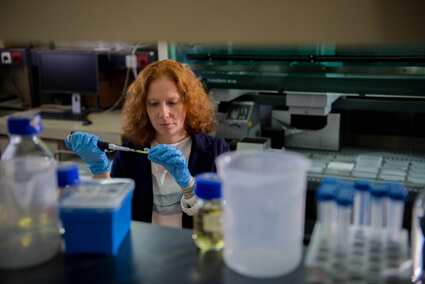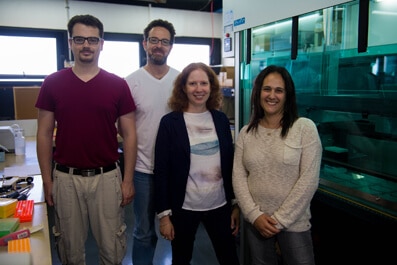"Science leads you in directions you didn't think about before, and you have to navigate your way in it," says Prof. Reut Shelgi, who returned from MIT to Israel (thanks to the Technion) and is currently researching the ribosome stopping mechanism and its possible involvement in diseases such as Alzheimer's and Parkinson's

"As a scientist, I am faced with an endless world of things that I can explore. Science leads you in directions you hadn't thought of before, and you have to navigate your way through it, but also let it lead you."
Prof. Reot Shelgi, who recently received the prestigious Alon scholarship for recruiting young and outstanding faculty, joined the ranks of the Technion in October 2014. Today, as a faculty member at the Rappaport Faculty of Medicine at the Technion, she focuses on translation control - the process of protein production in the cell by the ribosome. This is a continuation of her discovery from the postdoctoral period: the stopping of the ribosome during translation in response to extreme environmental conditions (stress). With the return to normal, the mechanism renews the process of protein production essential to the body. "In our opinion, this mechanism is involved in neurodegenerative diseases such as ALS, Alzheimer's, Parkinson's and Huntington's, diseases in which the proteins fold incorrectly and therefore undergo aggregation, that is, they form a protein precipitate."
Prof. Shelgi completed her first degree - double degree in biology and computer science - with honors at Tel Aviv University. Her final project dealt with a science that was still in its infancy: bioinformatics, which means using statistical tools and computer science tools to draw conclusions about biology and pharmacology. Her skills in computer science led her to work at the high-tech company Red Vision already in her first degree. She did her second and third degrees at the Weizmann Institute in the field of life sciences: the study of genetic expression control in a combination of molecular biology with bioinformatic means.
"The branch of bioinformatics combines biology and computer science from a systemic view of the living cell," explains Prof. Shelgi. "Systems biology provides us with an overview of biological processes inside the cell, while classical biology gives us the in-depth view."
In her doctorate, under the guidance of Professors Tzachi Flafel and Moshe Oren from the Weizmann Institute, Prof. Shelagi studied the different levels of control responsible for the creation of the protein. At the end of her PhD in 2009, she went on to do a post-doc at MIT. There, under the guidance of Professors Chris Berg and Susan Lindquist, she studied the control of translation in the cell in extreme environmental conditions and the interaction between the ribosome and chaperones (proteins that help the other proteins in the cell to fold).
She remembers the postdoctoral period - five years in Boston, where her eldest daughter was born - positively, but "I really wanted to return to Israel, to my family and to the familiar environment. Happily, I was accepted at the Technion with open arms and a lot of support, and last October we returned to Israel - thanks to the Technion. I brought advanced research methods with me from MIT, and I apply them in my new lab at the faculty."

One of these methods is the robotic monitoring of interactions between proteins. The robot samples hundreds and thousands of interactions per day, and provides quantitative information on each interaction between a pair of proteins. Prof. Shlegi analyzes the data collected by the robot using bioinformatic methods, and thus maps the control network of the translation system in the cell and the connections between the proteins. "The robot allows me to map entire networks of proteins at once, and using bioinformatic tools I analyze the internal communication in this network and its possible effects on translational control."
In moving from MIT to the Technion, she emphasizes, there was no compromise on the research-scientific level. "The faculty and the Technion give me the highest standards. It is a very diverse faculty, with a strong and good interface between scientific and clinical research. The new track in medical sciences opens up for students in the Faculty of Medicine at the Technion the possibility to concentrate in the scientific-research field and become researchers. Medicine is a recognized and obvious profession for everyone, but not everyone understands what it means to be a researcher, what he does on a daily basis. In order to develop a new drug or a new treatment, the mechanisms underlying the disease or disorder must be deeply understood, and this is our mission, the full-time researchers."

2 תגובות
Well done, an article of great importance and knowledge.
Thank you
Well done, cheers.
You and other scientists like you stand at the forefront of science and do the most important and interesting work there is.